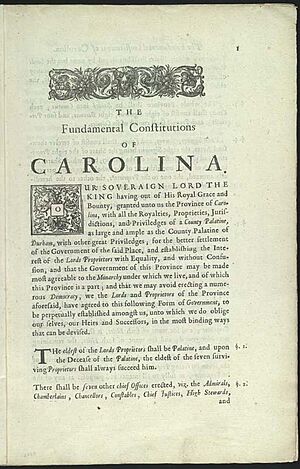Fundamental Constitutions of Carolina facts for kids
The Fundamental Constitutions of Carolina were a set of rules for the Province of Carolina. This large area covered most of the land between what is now Virginia and Florida. Eight powerful men, called the Lords Proprietors, created these rules. They adopted them on March 1, 1669. These new rules replaced earlier documents like the Charter of Carolina.
The Constitutions were a unique legal document. They tried to create a society with a feudal social structure. This meant society was organized with different levels of power, similar to how things were in medieval times. For example, they had special rules for how trials worked.
Some people thought the colonists and the British Crown didn't care much for these rules. But that's not true. The Constitutions were a real legal document. They helped shape how power was shared and how land was given out in the Carolinas. Colonists worried about some parts, especially how the rules made the Proprietors seem like super-important noblemen. Also, some rules were just too hard for settlers to follow. Because of this, the Proprietors had to change the rules five times! The Constitutions were later partly removed after a big change in England called the Glorious Revolution. The Proprietors and the King wanted a government with powerful lords. They said they wanted to avoid creating a "numerous democracy" (a government where many people have power).
Contents
Who Wrote the Carolina Constitutions?
Many people believe that John Locke played a big part in writing the Fundamental Constitutions. Locke was a famous thinker and writer. At the time, he worked for one of the Carolina Proprietors, Anthony Ashley Cooper.
Historians like David Armitage and Vicki Hsueh think Locke and Cooper wrote the Constitutions together. However, historian Holly Brewer has a different idea. She says Locke was just a paid secretary. She believes he wrote the Constitutions much like a lawyer writes a will, following instructions from the Proprietors. The document was a legal paper signed by the eight Lords Proprietors.
What Were the Main Ideas?
John Locke's later writings became very famous. This brought more attention to the Constitutions. People looked at them to understand early ideas about classical liberalism (ideas about individual rights and freedoms). Some historians suggest the Constitutions were one of the first printed works connected to Locke.
Religious Freedom in Carolina
The Constitutions allowed for a lot of religious tolerance. Even the famous writer Voltaire praised it! He said, "Look at Carolina, where the wise Locke was the legislator." The rules protected groups seeking safety for their religious beliefs.
Article 97 of the document said that people who were not Christian, like Native Americans or Jews, should not be treated badly. It also said that people moving to Carolina would have different religious views. The Constitutions promised them the freedom to worship. It stated that any seven or more people who agreed on a religion could form a church. This meant religious groups outside of Christianity, like Jews, could worship freely. It even promised tolerance for Native Americans who practiced their own religions.
Social Structure and Power
The Constitutions also had some less fair ideas. They were more about aristocracy (rule by a small, privileged group) than democracy. The Fundamental Constitutions supported both a noble class and slavery in North America.
Article 110 of the Constitutions was very harsh. It stated that "Every freeman of Carolina shall have absolute power and authority over his negro slaves." This meant slaveholders had complete control over their slaves. The rules even said that becoming a Christian did not change a master's power over his slaves. Some historians argue that Locke's early work on these Constitutions shows his involvement with plans to promote slavery. However, Locke's later writings showed his ideas changed. They reacted against the strict social structure promoted by these Constitutions.
New Noble Titles and Land Ownership
The Constitutions also created new noble titles. The King's original charter for Carolina prevented the Proprietors from using titles already in England, like Earl or Baron. So, they made up two new titles: cassique and landgrave. These titles would be passed down from father to son. These nobles had special rights. For example, they could only be tried in the Chief Justice's Court. They would also be judged by a jury of other nobles.
Besides slavery, the Constitutions also created a system of serfdom. People in this system were called leetmen. Like slaves, leetmen and leetwomen were under the control of noblemen.
The Lords Proprietors and the noblemen owned a large part of the Colony's land (two-fifths). However, regular freemen also had the right to own property. If a freeman owned more than fifty acres, they had the right to vote. If they owned more than five hundred acres, they could become a member of Parliament. This land ownership requirement was seen as quite fair compared to England at the time.
Other Interesting Rules
Elections in Carolina were to be held by secret ballot. This was not common practice in England yet. Another interesting rule was that laws would automatically expire after one hundred years. This prevented old, outdated rules from staying in effect forever.


